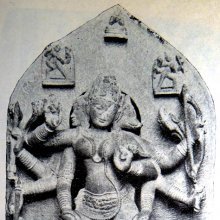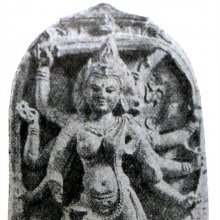Saindhava, Saimdhava: 29 definitions
Introduction:
Saindhava means something in Buddhism, Pali, Hinduism, Sanskrit, Marathi, biology. If you want to know the exact meaning, history, etymology or English translation of this term then check out the descriptions on this page. Add your comment or reference to a book if you want to contribute to this summary article.
Saindhava has 29 English definitions available.
Images (photo gallery)
Languages of India and abroad
Sanskrit dictionary
[Deutsch Wörterbuch]
Source: Cologne Digital Sanskrit Dictionaries: Böhtlingk and Roth Grosses Petersburger WörterbuchSaindhava (सैन्धव):—(von sindhu)
1) adj. (f. ī) a) zum Meere in Beziehung stehend: bindavaḥ Tropfen aus dem Meere [Oxforder Handschriften 129,a,10.] vom Meere stammend, daselbst wohnend: śrāvakāḥ [TĀRAN. 221. 230. 241. 255. 274. 303.] — b) zum Indus gehörig, vom Indus und Indusland kommend u. s. w. [Pāṇini’s acht Bücher 4, 3, 33. 93.] gaṇa kacchādi zu [2, 133.] [Hemacandra’s Anekārthasaṃgraha 3, 715.] [Medinīkoṣa v. 55.] guggulu [Atharvavedasaṃhitā 19, 38, 2.] Wasser [Taittirīyasaṃhitā 7, 4, 13, 1.] Pferde (auch m. mit Ergänzung eines Wortes für Pferd) [Amarakoṣa 2, 8, 2, 12.] [Trikāṇḍaśeṣa 3, 3, 423.] [Hemacandra’s Abhidhānacintāmaṇi 1234.] [Hemacandra’s Anekārthasaṃgraha] [Medinīkoṣa] [Halāyudha 2, 284.] [Rājanirghaṇṭa 19.] [The Śatapathabrāhmaṇa 11, 5, 5, 12. 14, 9, 2, 13.] [Mahābhārata 3, 15672. 7, 276. 3898.] [Bhāgavatapurāṇa 9, 1, 23. 10, 69, 35.] [Pāṇini’s acht Bücher 1, 3, 35, Scholiast] —
2) m. a) pl. die Anwohner des Indus (vgl. sindhu) [Pariśiṣṭa des Atharvaveda] in [Weber’s Indische Studien 10,317.] [Mahābhārata.3,1991. 14,2221.] [Varāhamihira’s Bṛhajjātaka S.5,71.] [Viṣṇupurāṇa 2,3,17.] [Oxforder Handschriften 217,b,24.] wohl sg. Bez. des Landes [338,b,25. fg.] Bez. eines Geschlechts [352,b,3.] — b) ein Fürst der Anwohner des Indus [Mahābhārata 1, 7001. 2, 1267. 3, 15850. 4, 526. 6, 1723. 14, 2229.] [Mudrārākṣasa 18, 17.] [VARĀH.] [YOGAYĀTRĀ 3, 18.] [Bhāgavatapurāṇa 1, 15, 16.] — c) ein Pferd aus dem Induslande s. u. 1,b). — d) Nomen proprium eines Lehrers [Oxforder Handschriften 55,b,37.] — e) pl. Name einer auf Saindhavāyana zurückgehenden Schule [Viṣṇupurāṇa 3, 6, 12.] —
3) m. n. gaṇa ardharcādi zu [Pāṇini’s acht Bücher.2,4,31.] [Siddhāntakaumudī 251,b,1.] Steinsalz. das sich im Induslande in grossen Lagern findet, [Amarakoṣa 2, 9, 42.] [Trikāṇḍaśeṣa] [Hemacandra’s Abhidhānacintāmaṇi 941.] [Hemacandra’s Anekārthasaṃgraha] [Medinīkoṣa] [Halāyudha 2, 459.] [Ratnamālā 85.] [Rājanirghaṇṭa 6, 90.] ghana [The Śatapathabrāhmaṇa 14, 7, 3, 13.] khilya [?5, 4, 12. MAITRYUP. 6, 35 (Manu’s Gesetzbuch). Suśruta 1, 134, 10. 148. 14. 226, 15.] cūrṇa [42, 10.] sarpis [368, 21. 2, 330, 7.] [Varāhamihira’s Bṛhajjātaka S. 16, 25. 51, 32] (so v. a. etwas Salziges). [Oxforder Handschriften 103,b,2. 235,b,3. 237,a,14.] śilāśakala [Raghuvaṃśa 5, 73.] Accent eines darauf auslautenden comp. [Pāṇini’s acht Bücher 6, 2, 72.] śukla Steinsalz an Weisse, weiss wie St. [Scholiast] —
4) f. ī Name einer Rāgiṇī [WILSON] angeblich nach [Halāyudha] —
5) n. ein von Musik begleiteter Gesang in Prākrit eines von seiner Geliebten im Stich gelassenen Liebhabers [Sāhityadarpana 504. 508.] — Vgl. susaindhavī .
Sanskrit, also spelled संस्कृतम् (saṃskṛtam), is an ancient language of India commonly seen as the grandmother of the Indo-European language family (even English!). Closely allied with Prakrit and Pali, Sanskrit is more exhaustive in both grammar and terms and has the most extensive collection of literature in the world, greatly surpassing its sister-languages Greek and Latin.
See also (Relevant definitions)
Starts with: Saindhavacurna, Saindhavadhana, Saindhavadi, Saindhavaghana, Saindhavaka, Saindhavakhilya, Saindhavalavana, Saindhavaprani, Saindhavaranya, Saindhavasarpis, Saindhavashila, Saindhavashilashakala, Saindhavayana, Saindhavayani.
Ends with: Dyusaindhava, Lavanasaindhava, Panasaindhava, Saktusaindhava, Saurasaindhava.
Full-text (+98): Saindhavaka, Pancalavana, Saindhavaghana, Sindhava, Saindhavayani, Lavanasaindhava, Saindhavayana, Saurasaindhava, Saimdava, Sindhuttha, Saindhavasarpis, Saindhavacurna, Saindhavakhilya, Saindhavashilashakala, Dhauteya, Shendilona, Dhautaya, Shendhelona, Shendelona, Padvisha.
Relevant text
Search found 53 books and stories containing Saindhava, Saimdhava, Saiṃdhava; (plurals include: Saindhavas, Saimdhavas, Saiṃdhavas). You can also click to the full overview containing English textual excerpts. Below are direct links for the most relevant articles:
Garga Samhita (English) (by Danavir Goswami)
Verse 6.15.25 < [Chapter 15 - The Glories of Nṛga-kūpa and Gopī-bhūmi]
Verse 6.8.4 < [Chapter 8 - The Marriages of All the Queens]
Verse 8.13.63 < [Chapter 13 - A Thousand Names of Lord Balarāma]
Impact of Vedic Culture on Society (by Kaushik Acharya)
Mingling of Cultures (R): The Saindhavas < [Chapter 4]
Systems of Administration during the Early Period (Introduction) < [Chapter 5]
4. Religious Aspect of Dāna < [Chapter 2]
The Garuda Purana (by Manmatha Nath Dutt)
Chapter CCXVII - Various Recipes for the cure of sterility, virile impotency, etc. < [Dhanvantari Samhita]
Chapter LV - Description of the Geographical situations of the different countries of the earth < [Agastya Samhita]
Chapter CCII - Various other medicinal Recipes (continued) < [Dhanvantari Samhita]
Mahabharata (English) (by Kisari Mohan Ganguli)
Section LXXVIII < [Anugita Parva]
Section LXXVII < [Anugita Parva]
Section CCLXIX < [Draupadi-harana Parva]
Sahitya-kaumudi by Baladeva Vidyabhushana (by Gaurapada Dāsa)
Text 10.67 < [Chapter 10 - Ornaments of Meaning]
Amarakoshodghatana of Kshirasvamin (study) (by A. Yamuna Devi)
Daily Life (1): Food and Drinks < [Chapter 3 - Social Aspects]
Related products
(+46 more products available)









